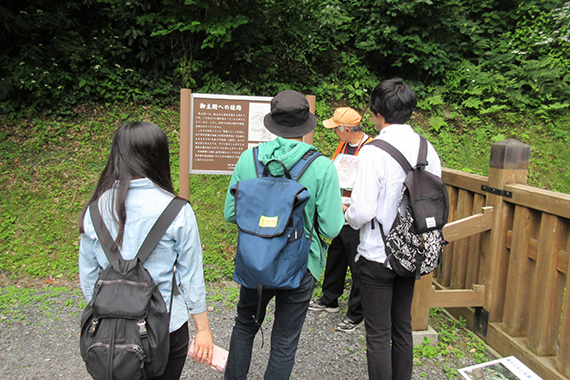
- 八王子キャンパス
経済学部 観光経営学科

- 八王子キャンパス

「経営」の視点から、
企業や地域の発展に貢献する人材を育成します
観光地に人を集め発展させるためには、企業や地域の「経営」の視点が欠かせません。観光経営学科では、現代社会における観光の意義や消費のメカニズムなど、観光に関する知識を幅広く学びながら、観光の現場を想定した実学教育により興味の対象を深く掘り下げます。豊かな国際感覚と確かな専門知識をあわせ持ち、企業や地域の発展に貢献できる人材を育成します。

観光学実習
経済・経営等の基礎的知識を理解し観光に関連する社会現象を説明するとともに、修得した多様な知識に基づき、観光にかかわる実地で行動に移せるようになることを目的として、現地実習を伴う少人数の授業です。1年次対象の「入門観光学実習」では、箱根のセミナーハウスを起点としフィールドワークを通した地域の観光振興について学びます。2年次対象の「観光学実習」では、空港・宿泊施設・エコツーリズム・地域の観光協会などの観光の現場を体験し、学生自らが現場の課題を見出していきます。観光の現場では、さまざまな知識を生かす必要があるだけでなく多くの経験が求められます。観光学実習では、関係者の講義、現場見学やフィールドワークを通して、より実践的な「学び」を行うことで現場での対応力向上につながることが期待できます。
観光経営学科では、演習や実習、実務研修など実効性の高い教育・指導により、観光地の計画と経営、その枠組みとなる政策・法制などの教育、研究を行っています。総合基礎科目では観光にかかわる基礎的知識、専門教育科目でさまざまな課題を解決する思考力、共通選択科目と演習系科目では将来に対する目標と主体的な行動力を養います。
観光学概論
本授業では、観光経営学科のすべての教員が1年生にオムニバス形式で授業を行うことで、観光学の重要性や全体像、基礎をしっかり学んでもらうことに主眼を置いています。さらに、観光学を知ることで、自分の興味関心のある分野や対象を主体的に選び取り、学生生活や将来設計にも有効活用してもらっています。学生の皆さんは、各先生の最先端の専門分野を概観していくなかで、入学当初に持っていた観光に対する漠然としたイメージを深化させていき、その幅広さや奥深さを学び取るキッカケとしています。あるいは、今まで知らなかった分野・対象を知ることで、新たな興味関心を芽生えさせる機会ともなっています。さらに、授業のなかで学んだ内容を実際に見たり、聞いたり、話したりするなかで、観光をより魅力あるものとして実践していくことにもなります。
観光経営学
観光供給を担う各種事業活動(=観光事業)の全貌を、経営学の枠組みと理論に基づいて概観します。そのために、観光経営の現場における問題の所在、諸問題が生起するメカニズム(原因と結果の関係)、諸問題の解決に資する方策、観光のさらなる振興に寄与する事業創造など、理論と事例分析を通して考察します。前期は観光経営の基礎理論、後期は観光事業の経営および環境の理解を中心に授業を行います。観光経営に関する理論に基づき、観光事業を取り巻く環境に対する理解を深めて、観光事業の諸分野を概説できることをめざします。
観光まちづくり論
我が国の観光形態は近代化の過程を通して変化してきています。その変化への対応によって、観光地としての盛衰が分かれます。前期は、我が国の観光地域の変遷をたどり、現代そしてこれからも生かすべき観光計画の哲学・思考・手法について、いわば観光計画版の”プロジェクトX”的な授業により考察し理解を深めます。後期は、これからの観光地計画において特に大切となる「観光実態の把握手法」「人の気を惹くテーマの導き(着地型地域体験商品づくり)」「中心となって進める組織」について、事例から導く原理・原則と今後への展開を解説した後、実際にミニ演習を通して理解を深める形式での授業を展開しています。来訪者に楽しい気持ちになっていただくことが観光の基本です。知識を得るだけでなく、知識の活用法についても修得します。
観光文化論
本授業では、「観光文化とは何か?」という問題を、日本における観光文化の多様性と、世界における観光文化の負の側面に焦点を当てながら考えていくものです。文化としての観光の捉え方は必ずしも一様ではなく、違う角度から見れば違った文様で見える、万華鏡のような存在です。その捉え方によって時には地域や関与する人びとに活力を与え、時には問題を引き起こす原因ともなってきました。観光文化の持つこの力を、テーマごとに事例をあげながら、学生の皆さんと一緒に議論を進めています。答えのない問題と授業の進め方に、多くの学生の皆さんは初め、非常に戸惑います。しかし、自分なりの考えを積み重ねていくなかで、個々のテーマを自分のものとして引きつけていくと同時に、観光学としての文化の捉え方を学んでいきます。
GPA(Grade Point Average)制度の導入の趣旨は、1. キャンパスとして統一した基準を作成すること、2. 公平性に優れた基準であること、3. 国際的に通用する基準であることとし、学修の成果をGPAという客観的な数値で評価するものです。またこの制度は、欧米の大学で採用されている成績評価制度に概ね準拠しており、海外留学、海外の大学院進学、外資系企業への就職などの際に学力を証明する指標として、海外でも通用する成績評価制度となっています。
| 区分 | 評価 | GPA | 成績評価基準 | 評価内容 | 英文内容 |
|---|---|---|---|---|---|
| 合格 | S | 4.0 | 90点以上 | 特に優れた成績を表します | Excellent |
| A | 3.0 | 80点台 | 優れた成績を表します | Good | |
| B | 2.0 | 70点台 | 妥当と認められる成績を表します | Satisfactory | |
| C | 1.0 | 60点台 | 合格と認められる最低限の成績を表します | Pass | |
| 不合格 | D | 0.0 | 60点未満 | 合格と認められる最低限の成績に達していないことを表します。また、授業等の出席日数不足および当該授業における試験の未受験等も含みます | Failure |
| 対象外 | N | - | - | 編入や留学等により他大学等で修得した科目を本学の単位として認定したことを表します(単位認定科目) | Credits Transferred |

| 科目区分 | 必修・選択の例 | 所要単数 | |||||
|---|---|---|---|---|---|---|---|
| 共 通 教 育 科 目 ※4 | 教養 教育科目 | 人文科学系分野 | 選択必修 | 2以上 | 8以上 | 30※1 | |
| 社会科学系分野 | 2以上 | ||||||
| 自然科学系分野 | 2以上 | ||||||
| 文理融合分野 | 選択 | - | |||||
| 初年次 教育科目 | ライフデザイン演習Ⅰ・Ⅱ | 必修 | 2 | ||||
| キャリア 教育科目 | キャリア入門 | 必修 | 2 | ||||
| 情報教育科目 | 選択必修 | 2 | |||||
| 外国語 教育科目 | 現代英語Ⅰ・Ⅱ | 必修 | 4 | ||||
| 実用英語Ⅰ・Ⅱ | |||||||
| 専門科目※4 | 必修 | 12 | 74※3 | ||||
| 選択 必修※2 | 展開・ 総合科目 | 4 | |||||
| 経済学部 入門科目 | 16 | ||||||
| 人に学ぶ | 12 | ||||||
| 産業に 学ぶ | 8 | ||||||
| 地域に 学ぶ | 8 | ||||||
| 選択 | 14 | ||||||
| 自由選択 | ・専門科目74単位の超過単位 ・共通教育科目30単位の超過単位 ・オープン科目の修得単位 ・副専攻プログラムの修得単位 ・他大学での認定単位 | 選択 | 20 | ||||
| 合計 | 124 | ||||||